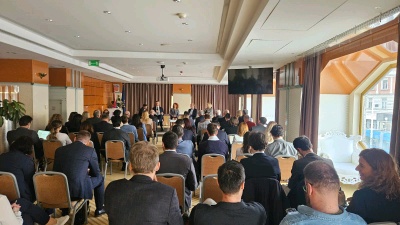
The Balkans in Europe Policy Advisory Group (BiEPAG), in collaboration with the Institute for Development and International Relations (IRMO), organized a high-profile panel discussion titled "Geopolitical Shifts and Security in the Western Balkans: What’s Next?". The event took place on Thursday, 3 April 2025, at Hotel Dubrovnik, Zagreb, gathering prominent experts and stakeholders to discuss the current geopolitical and security challenges faced by the Western Balkans.
Regional Dynamics and Security Challenges
In an increasingly dynamic global and European context, the Western Balkans remains a focal point for political stability and security. The region’s geopolitical landscape is continuously shaped by both internal challenges and external influences, necessitating strategic engagement from the European Union and its member states. The panel provided an invaluable opportunity for experts, policymakers, diplomats, and the public to engage in a nuanced dialogue about these pressing issues.
The discussion brought together distinguished panelists, including:
- Matija Očuršćak, Head of the Sector for Southeast Europe and the EU Enlargement Process, Ministry of Foreign and European Affairs of Croatia
- Dr. Senada Šelo Šabić, Scientific Advisor, IRMO
- Prof. Dr. Florian Bieber, Professor of Southeast European History and Politics, University of Graz; BiEPAG Coordinator
- Dr. Donika Emini, Executive Director, CiviKos; BiEPAG Member
The panel was moderated by Samir Beharić, Programme Manager at BiEPAG, who guided the discussion through several thematic rounds, emphasizing geopolitical challenges, political stability, and the role of Croatia and European Union.
Key Points of the Debate
During the panel discussion, the participants explored a variety of critical issues that are shaping the security landscape of the Western Balkans. One of the primary topics was Croatia’s foreign policy approach towards the region, with a particular focus on how the country balances its commitment to political stability amid ongoing challenges and security concerns.
Special attention was given to the pressing security challenges in Bosnia and Herzegovina, including the increasingly destabilizing rhetoric and actions by Republika Srpska's leadership. Additionally, the panelists addressed the ongoing student protests in Serbia, examining how the lack of significant Western support has impacted the momentum of these movements and the broader implications for democratic resilience in the country.
The discussion also covered the European Union’s role in mediating conflicts and maintaining stability, especially in light of recent geopolitical shifts on an international level and heightened tensions within the region.
Another significant theme was the influence of external actors, such as Russia and China, on the political dynamics of the Western Balkans, as well as the broader implications for the EU integration process. The panelists also emphasized the crucial role of civil society in fostering dialogue and bridging political divides, particularly in the face of renewed tensions that threaten regional cohesion.
The event succeeded in fostering an open and insightful exchange among experts and stakeholders, highlighting the complexity of geopolitical dynamics in the Western Balkans. Participants emphasized the need for continued engagement from both EU institutions and local actors to address the multifaceted challenges impacting regional security and political cohesion.
Following the discussion, attendees had the opportunity to engage in networking during a cocktail reception, facilitating further dialogue and collaboration. The outcomes of the panel will serve as a basis for upcoming policy initiatives and further cooperation between BiEPAG and IRMO in addressing the evolving political and security landscape of the Western Balkans. The event once again reaffirmed the importance of joint efforts in promoting stability, democracy, and sustainable cooperation in the region.
Strengthening Diplomatic Engagement
The following day, representatives of BiEPAG and IRMO visited the Ministry of Foreign and European Affairs of the Republic of Croatia to discuss the key topics addressed during the panel. The meeting provided a valuable opportunity to delve deeper into the security challenges highlighted during the discussion.
Croatian officials and panel participants explored how Croatia, as both an EU member state and a key regional actor, can contribute to fostering political stability and security in the Western Balkans. Emphasis was placed on the importance of continued dialogue and cooperation between regional and European actors to effectively address these challenges.